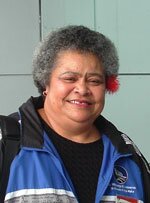22 November 2008
Getting older and wiser
1 September 2006
By Ali Bell: Te Waha Nui Online
 |
Photo Ali Bell
|
The number of older people studying at New Zealand universities and polytechnics has doubled in a decade, according to a recent Ministry of Education report.
The report says 30 per cent of tertiary education students are aged 40 and over, and 35 per cent of that growth, since 2000, is due to the popularity of Te Wananga o Aotearoa.
Women are in a slight majority of the student population at most ages, but there is a noticeable gain in female participation from ages 40 to 54.
“This partly reflects their return to education and/or the workforce after having children,” says the report.
Of students aged 65 and over, Maori comprise 25 per cent of that age group.
The sheer number of baby boomers accounts for part of the trend for older people to study.
The rest is credited to New Zealand’s relatively open tertiary education system, and diverse range of flexible learning options for vocational and general education.
“The Wananga o Aotearoa has been particularly successful in attracting into study older students with no previous school qualification,” says the report.
‘High quality, no fees’
A recent promotion for the institution advertised ‘high quality, no fees”.
 |
Photo Ali Bell
|
Katoanga Manuopangi, 55, is a mother and grandmother, and a student at Te Wananga o Aotearoa at Mangere.
She says she loves studying and is glad she didn't listen to those who doubted her.
"People at church said, 'Why do you want to go and learn? You're too old.' I said I don't care. It's not too late to learn."
Manuopangi wanted to improve her English and work skills to go back into the workforce. She had left an early successful Tongan-language sales career to look after her sick mother.
She became motivated to study after watching her 32-year-old daughter on the computer.
"I thought 'how do you do that? Maybe I can learn to do that?' So I did." She enrolled in both an English language and Level 1 computing course.
"There are other students older than me," she says.
"I have recommended the computing course to friends - both of them are 53. There is a woman here who is 70 years old."
Popular courses
Cherie Trevan, marketing manager for the Mangere campus of Te Wananga o Aoteroa, says the most popular courses are computing and short courses in small business management.
On their attraction she says: “Our teaching technique is different. We use hands on teaching methods, have smaller classes, and nearly every class has a marae sleepover.
“We work on personal development and building confidence, so people can progress further.”
Manuopangi says teachers are welcoming, kind and encouraging.
"They're always on our side. I feel like I've been here a long time, in a really good way. But it's only been a year."
This can be in contrast to traditional tertiary institutions, where 40 plus students, despite their large numbers overall, can feel marginalised.
Students aged 40 and over are 12 per cent of total student numbers at AUT University this year. But their numbers are spread out over both campuses in lots of different courses at the university.
It’s similar at Auckland University, with close to 14 per cent in 2005.
Wrong peer-group
A 40-year-old mother of two, who did not wish to be named, is an Auckland university student and tutor. She is surprised that 30 per cent of students are aged 40 and over.
"Where are they? I don't see them. Here it's almost like a senior high. Sometimes I feel like I'm in the wrong place, with the wrong peer-group. I feel like I've missed the boat somewhere."
Older students can form different group and teacher-student dynamics, she says.
"Women lecturers and teachers treat me more as an equal. But with male teachers - particularly if they are around my age - there tends to be more tension.
“They're often more dismissive. Sometimes I’ll be having a good conversation with them and then another time there’ll be distance and abruptness, and that doesn’t happen with the women.”
In group work, she reports operating under “a cloud of stereotype" – at least from European students, where the benefit of age is not so respected, she says.
“I feel they think I'm a liability because I'm older, although my grades are actually very good."
However, she has the opposite experience in her major subject, with largely non-European students, and she loves university.
“I love learning. Learning and tutoring keeps me in touch with current thought and issues.”
Link:
- Te Wananga o Aotearoa


